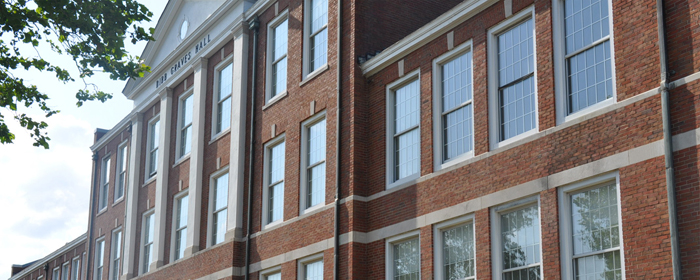Graduate Social Work Receives $1.9M HRSA Award

Toward Meeting Demand for Mental Health Practitioners
The Master of Social Work Program at Alabama A&M University (AAMU) has received a $1.9 million award to help its students meet workforce demands for mental health practitioners specializing in integrative behavioral health. The four-year award from the Health Resources and Services Administration (HRSA) will provide AAMU $479,917 annually further the second phase of its Behavioral Health Workforce Training Program (BHWTP-2).
AAMU is one of 168 organizations across the nation to receive awards totaling $66 million. It also joins only three other grantees in Alabama to receive the award during this funding cycle (i.e., Auburn University, Samford University and UAB).
"Collaborating with community-based partners such as public health organizations, hospitals, and schools presents an opportunity to reduce disparities in access to behavioral health services," said Acting HRSA Administrator Diana Espinosa. "Through these experiential training opportunities, members of the behavioral health workforce will get on-the-ground training in the communities and with the populations they will serve.”
Through placements at health centers and other community-based settings, trainees will gain experience working in the underserved communities where behavioral health services are most urgently needed, Espinosa added. The award represents the third million-dollar award that the Graduate Social Work Program at AAMU has received in the last four years from HRSA’s Behavioral Health Workforce and Education Training (BHWET) Program.
“Over the last four years, the MSW Program has emerged as the lead producer of external funds within the College of Education, Humanities and Behavioral Sciences, and it has set an important standard as it relates to external funding to support the preparation of students in professional disciplines,” stated Dr. Daniel K. Wims, Provost and Vice President for Academic Affairs and Research.
“Our first HRSA funding award supported 116 students in the four (4) cohorts of Behavioral Health Workforce Training Fellows who have successfully matriculated through the MSW Program,” stated Dr. Pamela Plummer, Director of Social Work Programming and Professional Preparation and Co-Principal Investigator and evaluator on the grant. “They are now in the workforce responding to the needs of individuals, families and communities whose unique constellation of challenges require mental health practitioners with critical knowledge and skills in the behavioral health arena.”
Moreover, through HRSA, the MSW Program currently has two mechanisms of support to extend to students in different phases of their matriculation. This includes the Opioid Impacted Families Training Apprenticeship Program (OIFP), which provides entering two-year students with tuition assistance, specialized training and a $7,500 stipend. Through the BHWTP-2 funding mechanism, Advance Standing students and continuing two-year students entering into the final year of the MSW Program are eligible for funding consideration. Under the BHWTP-2, 120 Fellows will receive specialized training and $5,000 for each of their final two semesters of field training in the program. Both programs are competitive and require an application and screening process. Between the two mechanisms of support, up to 60 students may be supported each year.
“From my vantage point, the new HRSA BHWET award, coupled with the BHWET-supported OIFP, is a win-win for the MSW Program, the College of Education, Humanities and Behavioral Sciences (CEHBS) and the Institution,” stated Dr. Lena Walton, CEHBS Dean.
Alabama Governor Kaye Ivey has noted that there is a shortage of master’s level social workers in the state. This reflects a national demand for social workers, who are the major providers of mental health services in the United States. The Bureau of Labor Statistics reports that overall employment of social workers is projected to grow 13 percent from 2019 to 2029, much faster than the average for all occupations. Employment of mental health and substance abuse social workers is projected to grow 17 percent from 2019 to 2029, much faster than the average for all occupations.
“This award is significant for the MSW Program because it supports us in providing our continuing and prospective students with another mechanism of funding to support their journey through the program. Armed with their MSWs and core behavioral health competencies, our graduates are well prepared to meet the most current workforce demands,” stated Dr. Samson Chama, Interim Chairperson of the Department of Social Work, Psychology and Counseling.
“The AAMU School of Graduate Studies is also supporting Alabama’s demand for master level social workers,” commented Gerald Vines, Director of Graduate Recruitment and Enrollment. “We are currently accepting applications for fall 2021 and spring 2022. We stand ready to support prospective students from initiation of the application through degree completion.”
 “We are elated by the funding opportunities available through the MSW Program’s new
funding mechanism. Our team is working actively to support the MSW Program in finding
students to whom to award the 60 fellowship slots that are available,” stated Dr.
Tonya Perry (left), Interim Associate Vice President for Academic Affairs and Dean
of Graduate Studies. Dr. Perry is the Principal Investigator of the BHWTP-2 award
and is the Immediate Past Chairperson of the Department of Social Work, Psychology
and Counseling.
“We are elated by the funding opportunities available through the MSW Program’s new
funding mechanism. Our team is working actively to support the MSW Program in finding
students to whom to award the 60 fellowship slots that are available,” stated Dr.
Tonya Perry (left), Interim Associate Vice President for Academic Affairs and Dean
of Graduate Studies. Dr. Perry is the Principal Investigator of the BHWTP-2 award
and is the Immediate Past Chairperson of the Department of Social Work, Psychology
and Counseling.
“For persons in the workforce who have been looking to be promoted in their current position in the human services arena or who may have a bachelor’s degree in an unrelated discipline and are looking to retool, now is a very good time to pursue an MSW at AAMU,” commented Dr. Perry. “We are still accepting applications for fall admission.”
Through the Office of Distance Education and Extended Studies, AAMU offers MSW Program courses in online synchronous and asynchronous formats on evenings and weekends, which cater to non-traditional learners who are employed full-time.
“For those for whom a traditional classroom format is a better fit for their learning style, classes are scheduled to return to a face-to-face format on the historic AAMU campus, as well as off site at Lawson State Community College (LSCC), where classes are offered in Birmingham on evenings and weekends,” stated Dr. Rhonda Moore Jackson, Interim Assistant Vice President for Distance Education and Extended Studies. All MSW Program classes at the LSCC site are delivered in a hybrid format, which provides students with the option of attending their classes remotely or in traditional format twice a month.
“We have course delivery formats to meet the needs of a diversity of learners,” added Dr. Turenza Smith Woods, Assistant Professor and Off-Site Coordinator of Social Work Programs at LSCC.
Persons interested in learning more about the MSW Program and submitting an application for admission are encouraged to visit: https://www.aamu.edu/admissions-aid/graduate-admissions/prospective-students.html